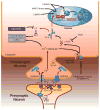Regulation of hippocampus-dependent memory by cyclic AMP-dependent protein kinase
- PMID: 18394470
- PMCID: PMC2914307
- DOI: 10.1016/S0079-6123(07)00006-4
Regulation of hippocampus-dependent memory by cyclic AMP-dependent protein kinase
Abstract
The hippocampus is crucial for the consolidation of new declarative long-term memories. Genetic and behavioral experimentation have revealed that several protein kinases are critical for the formation of hippocampus-dependent long-term memories. Cyclic-AMP dependent protein kinase (PKA) is a serine-threonine kinase that has been strongly implicated in the expression of specific forms of hippocampus-dependent memory. We review evidence that PKA is required for hippocampus-dependent memory in mammals, and we highlight some of the proteins that have been implicated as targets of PKA. Future directions and open questions regarding the role of PKA in memory storage are also described.
Figures

References
-
- Abel T, Nguyen PV, Barad M, Deuel TAS, Kandel ER, Bourtchuladze R. Genetic demonstration of a role for PKA in the late phase of LTP and in hippocampus-based long-term memory. Cell. 1997;88:615–626. - PubMed
-
- Ahi J, Radulovic J, Spiess J. The role of hippocampal signaling cascades in consolidation of fear memory. Behav Brain Res. 2004;149:17–31. - PubMed
-
- Alarcon JM, Malleret G, Touzani K, Vronskaya S, Ishii S, Kandel ER, Barco A. Chromatin acetylation, memory, and LTP are impaired in CBP(+/−) Mice: a model for the cognitive deficit in Rubinstein–Taybi syndrome and its amelioration. Neuron. 2004;42:947–959. - PubMed
Publication types
MeSH terms
Substances
Grants and funding
LinkOut - more resources
Full Text Sources
Medical

